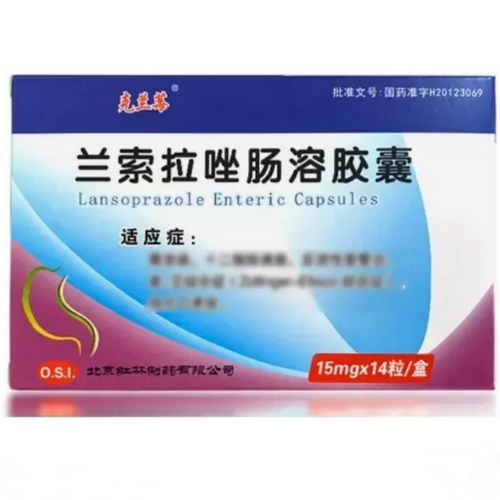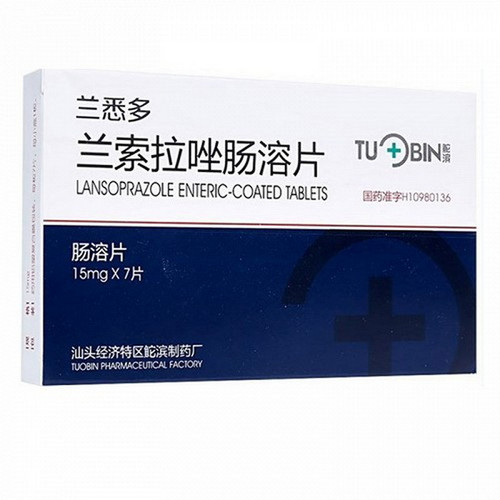Product Overview
【Drug Name】
Generic Name: Lansoprazole Capsules
Trade Name: Nan Guo Chun Lansoprazole Capsules 15mg*7 Capsules
Pinyin Code: Nan Guo Chun Lan Suo La Zuo Jiao Nang 15mg*7 Li
【Main Ingredient】
The main ingredient of this product is lansoprazole. Chemical Name: 2-[3-methyl-4-(2,2,2-trifluoroethoxy)-2-pyridyl]methyl]sulfinyl]-1H-benzimidazole
【Properties】
This product is a white capsule containing white or off-white enteric-coated spherical granules.
【Indications/Main Functions】
Gastric ulcer, duodenal ulcer, reflux esophagitis, Zollinger-Ellison syndrome, and anastomotic ulcers.
【Specifications】
15mg*7 Capsules
【Dosage and Administration】
For duodenal ulcers, adults should generally take 15mg-30mg of lansoprazole orally once daily for 4-6 weeks. For gastric ulcers and reflux esophageal tract infections, see Tablets.
【Adverse Reactions】
1. Hypersensitivity: Occasionally, symptoms such as rash and itching may occur. Discontinue use if these symptoms occur. 2. Liver: Occasionally, elevated levels of GOT, GPT, AL-P, LDH, and γ-GTP may occur. Careful observation is required. If abnormalities are detected, appropriate measures should be taken, including discontinuation of the drug. 3. Hematology: Occasionally, symptoms such as anemia, leukopenia, and eosinophilia may occur. Thrombocytopenia is rare. 4. Digestive System: Occasionally, symptoms such as constipation, diarrhea, thirst, and abdominal distension may occur. 5. Neuropsychiatric: Occasionally, symptoms such as headache and drowsiness may occur. Insomnia and dizziness are rare. 6. Other: Occasionally, fever, elevated total cholesterol, and elevated uric acid may occur.
【Contraindications]
This product is contraindicated in patients allergic to it.
【Drug Interactions】
1. Inhibition of (H++K+)-ATPase Activity: Lansoprazole inhibits (H++K+)-ATPase activity in dog gastric mucosal microsomes (in vitro studies). 2. Inhibition of Parietal Cell Acid Production: Lansoprazole inhibits acid secretion in isolated dog gastric mucosal parietal cells stimulated by histamine, acetylcholine, and gastrin (in vitro studies). 3. Inhibition of Gastric Acid Secretion: 1) Gastrin-stimulated acid secretion: In healthy adults, oral administration of lansoprazole 30 mg once daily for 7 consecutive days significantly inhibits gastrin-induced acid secretion, and this effect persists for 24 hours. 2) Insulin-stimulated acid secretion: In healthy adults, oral administration of lansoprazole 30 mg once daily for 7 consecutive days significantly inhibits insulin-induced acid secretion. 3) Nocturnal Acid Secretion: In healthy adults, oral administration of lansoprazole 30 mg once daily for 7 consecutive days significantly inhibits nocturnal gastric acid secretion. 4) 24-Hour Acid Secretion: In 24-hour gastric fluid sampling tests in healthy adults, oral administration of lansoprazole 30 mg once daily for 7 consecutive days significantly inhibits 24-hour gastric acid secretion. 5) 24-Hour Gastric pH Monitoring: In healthy adults and patients with duodenal ulcers, oral administration of lansoprazole 30 mg once daily for 7 consecutive days significantly inhibits 24-hour gastric acid secretion. 6) 24-Hour Lower Esophageal pH Monitoring: In patients with reflux esophagitis, oral administration of lansoprazole 30 mg once daily for 7 to 9 consecutive days significantly inhibits gastroesophageal reflux. 7) Gastric Acid Secretion in Rats and Gastric Pouch Dogs: This drug significantly and persistently inhibits basal acid secretion and acid secretion induced by histamine, gastrin, carbamylcholine, 2-deoxy-D-glucose, or water immersion stress in rats (in the duodenum). This drug also significantly and persistently inhibits acid secretion induced by various stimuli in gastric pouch dogs, demonstrating stable inhibitory effects during repeated dosing (oral administration). 4. Promoting the Healing of Chronic Ulcers: In rats, lansoprazole significantly promoted the healing of chronic gastric and duodenal ulcers induced by acetic acid (oral administration). 5. Inhibiting Ulcer Formation: In rats, lansoprazole significantly inhibited gastric ulcers induced by water immersion stress, aspirin, or ethanol, duodenal ulcers induced by mepirisol or cysteamine, and reflux esophagitis (oral or intraduodenal administration).
【Precautions】
1. Careful observation should be made during treatment. Due to insufficient experience with long-term use, it is not recommended for maintenance treatment. 2. Do not chew this product when taking it. Swallow the whole tablet with water. 3. Use with caution in the following patients: (1) Patients with a history of drug allergies. (2) Patients with liver and kidney dysfunction. 4. Because this drug can mask the symptoms of gastric cancer, gastric cancer must be ruled out before use.
【Use in Children】
The safety of this drug for children has not been established (due to very little clinical experience in children).
【Use in Elderly Patients】
Generally speaking, the gastric acid secretion capacity and other physiological functions of elderly patients are reduced, so please pay attention to observation during medication.
【Overdose】
Not yet clear.
【Pharmacology and Toxicology】
Not yet clear.






